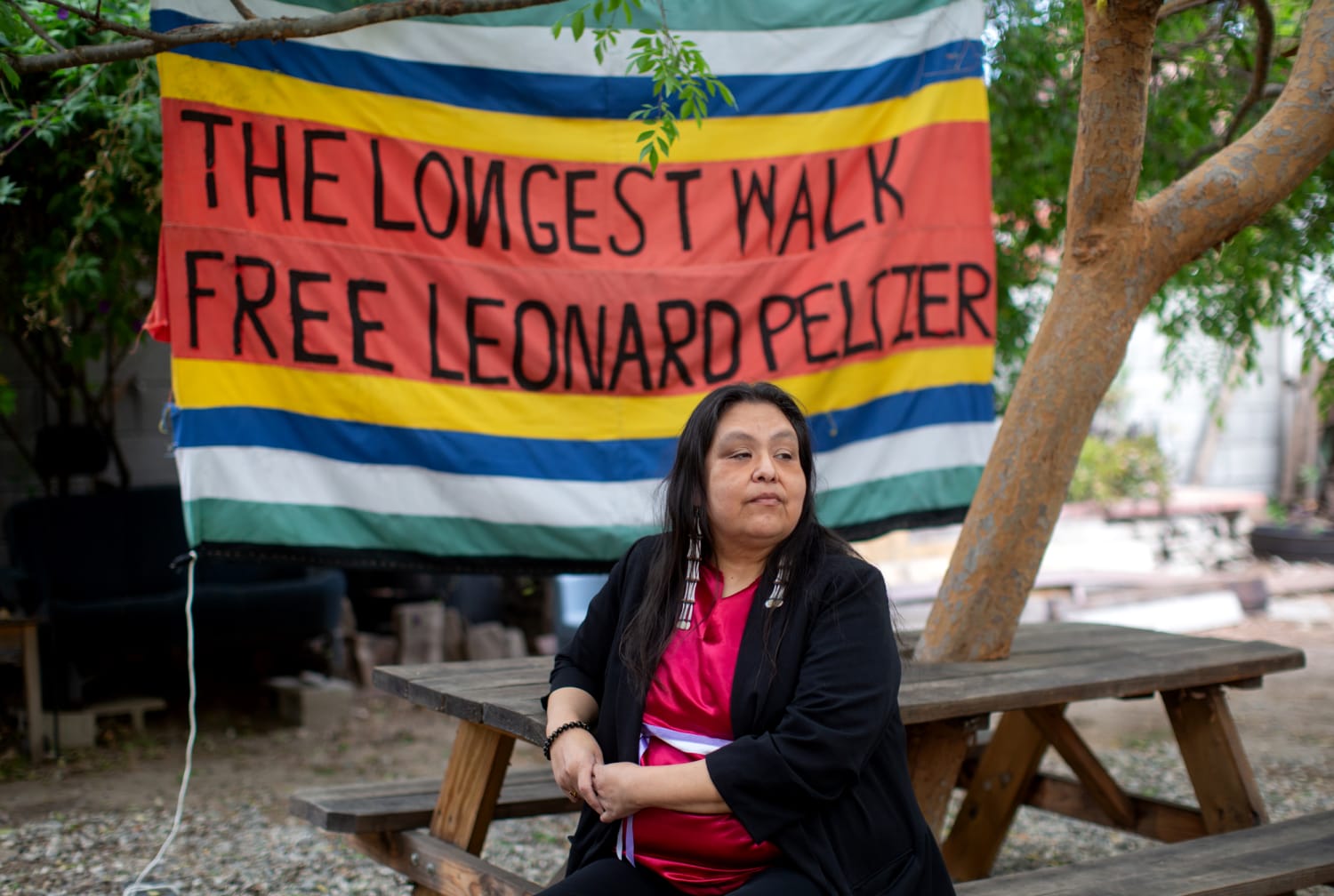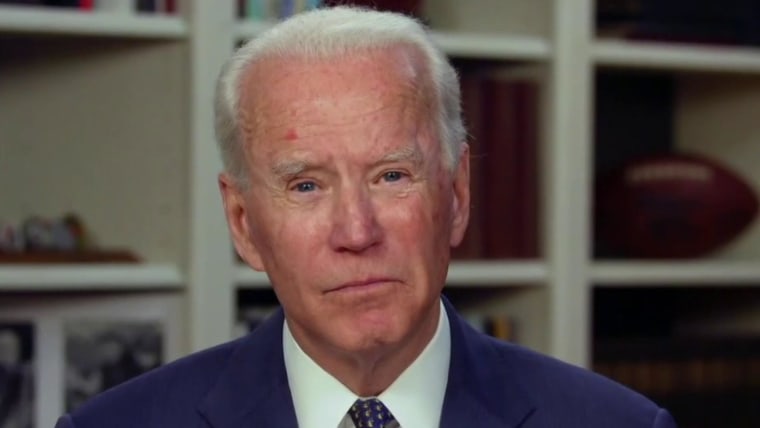Leonard Peltier, the Native American activist who has been imprisoned for nearly half a century for the murders of two FBI agents he has always maintained he didn’t commit, is hopeful he’ll have a chance to clear his name before he dies.
Peltier, 77, wants President Joe Biden to review his case and grant him clemency so he won’t die in prison.
He’s not looking for a presidential pardon, because it would be granted for a crime he insists he is innocent of.
Instead, he wants a new trial.
“If I get into court, if the judge is fair, how are they going to answer all of that?” he said of evidence that was withheld from the 1977 proceedings. “I want to get a trial.”
Recent calls from Peltier’s supporters and family for him to be released have noted his failing health, including a recent bout of Covid-19.
“They’re going to try and make me die here,” Peltier said by phone Wednesday from his federal prison in Central Florida, his first media interview since 2016. “I have a last few years, and I got to fight.”
Peltier’s family says he is struggling with diabetes, hypertension, partial blindness from a stroke and an abdominal aortic aneurysm and that he tested positive for Covid in late January at the Federal Correctional Complex Coleman’s high-security facility.
Peltier said he was vaccinated against the coronavirus before he tested positive and that his chest, neck and head had hurt for a few days. He got a booster shot after he left 10 days of quarantine, he said.
The roughest part, he said, was being isolated and not receiving adequate care. He felt “cold,” and “the food was bad,” he said, adding, “That was worse than getting Covid.”
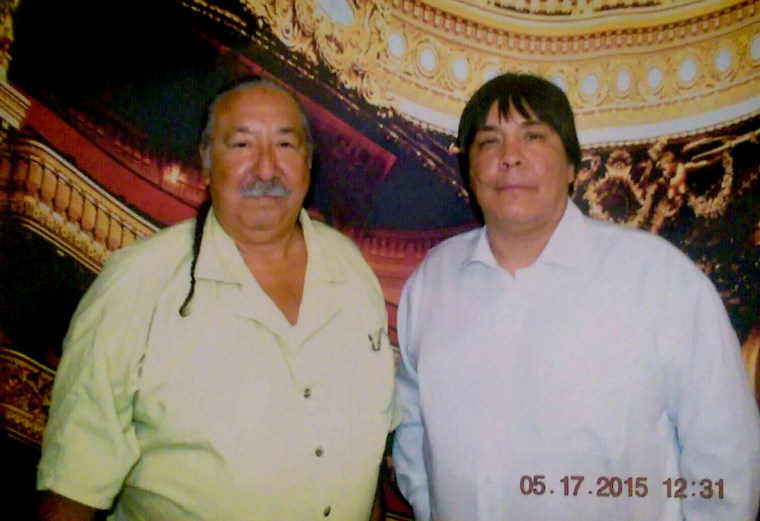
Having spent years in prison mulling over his case and the various legal rulings, Peltier said there is evidence he’d like to present to show he didn’t fire the bullets that killed the agents in a chaotic shootout on the Pine Ridge Indian Reservation in South Dakota in June 1975.
“My lawyer said if I were tried today, they would never get away with it,” he said.
His attorney, Kevin Sharp, a former federal judge, said Peltier has exhausted his appeals and that there remains no actual process for him to get a new trial unless federal prosecutors decide to reopen the case.
“They wouldn’t do that, because there’s no evidence to convict him on,” Sharp said. “He was convicted on aiding and abetting murder, but who did he aid and abet? His co-defendants were acquitted.”
Over the decades, criminal justice reform advocates have continued to highlight his arrest and conviction, saying it symbolizes systemic problems with how Native Americans are treated in the justice system, as well as imprisoned at higher rates by the federal government compared to other racial groups.
Human rights organizations and prominent political and religious figures, including Pope Francis and the Dalai Lama and other Nobel Peace Prize recipients, such as Nelson Mandela and Bishop Desmond Tutu, are reported to have called for Peltier’s release.
Peltier’s case has drawn scrutiny from those living on the Pine Ridge reservation, as well as members of his tribe, the Turtle Mountain Band of Chippewa. Other Native American activists and groups also believe Peltier is innocent and was made a scapegoat by the federal government in its pursuit to hold someone accountable for the agents’ deaths.
But he has consistently been denied parole — in 2009, federal prosecutors said he was “an unrepentant, cold-blooded murderer” — and he isn’t eligible again until 2024. In October, 11 members of Congress petitioned the Biden administration to grant clemency based on compassionate grounds.
Rep. Raúl Grijalva, D-Ariz., a clemency supporter, said he spoke with Peltier by phone after he learned Peltier had Covid. Grijalva’s office said last month that Peltier described “difficulties receiving adequate medical attention and gaining access to basic needs, like water.”
The Justice Department’s Bureau of Prisons declined to comment on Peltier’s case, citing privacy and security reasons. It said that it makes “every effort” to ensure the safety of inmates and that at Coleman, every inmate is given access to drinking water, adequate medical care and food.
Sharp said he believes Peltier’s age, health and recent illness make him a prime candidate for release and that his clean and nonviolent prison record also indicates he isn’t a threat to the public.
The number of inmates with Covid at federal prisons reached its peak around the time Peltier contracted the coronavirus, with close to 10,000 of them testing positive, according to Justice Department data. Active cases have dropped to about 100 this week, but Sharp believes Peltier is still at risk.
“Leonard Peltier is incapable of protecting himself. And if you’re not going to do it, BOP, let him go home,” Sharp said, referring to the Bureau of Prisons. “This is where justice and mercy meet. Grant him clemency and send him home.”
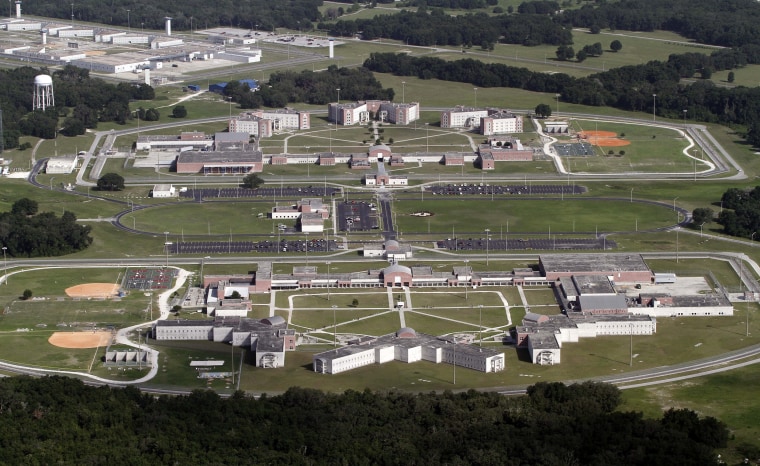
It’s unclear how familiar Biden is with Peltier’s case, which has spawned hundreds of pages of FBI files; several books, including his own memoir, published in 1999; and the 1992 documentary “Incident at Oglala,” which was narrated by Robert Redford.
Neither the White House nor the FBI responded to requests for comment about Peltier’s case.
Asked in January whether Biden was reviewing a request to commute Peltier’s sentence, White House press secretary Jen Psaki told reporters, “I don’t have anything to predict for you.”
In recent weeks, Democrats have tried to appeal to Biden. The Democratic National Committee’s Native American Caucus wrote in a letter last week that Peltier’s continued incarceration “symbolizes the decades-old racial injustice towards Native Americans,” HuffPost reported.
The encounter that led Peltier to prison involved two undercover FBI agents, Jack Coler and Ron Williams, who went onto a compound on the Pine Ridge reservation to arrest a man on a federal warrant in connection with the theft of a pair of cowboy boots, according to the agency’s investigative files.
Peltier was a member of the American Indian Movement, a grassroots activist organization that began in Minneapolis in the 1960s to challenge police brutality and the oppression of Native Americans’ rights. He was at Pine Ridge in 1975 in the wake of a drawn-out protest two years earlier at Wounded Knee, South Dakota, where armed American Indian Movement activists and Oglala Sioux tribal members had occupied the town and clashed with federal law enforcement officers. Two Sioux men were killed.
On the day Coler and Williams were at Pine Ridge, they radioed that they had come under fire. It’s unclear who pulled the trigger first; the FBI said the men were in a shootout that lasted 10 minutes. Both men were killed by bullets fired at close range. According to the FBI, Peltier was identified as the only person in possession of a weapon that could fire the type of bullet that killed them.
Dozens of people participated in the gunfight; at trial, two co-defendants were acquitted after they claimed self-defense. When Peltier was tried separately in 1977, no witnesses were presented who could identify him as the shooter, and unbeknown to his defense lawyers at the time, the federal government had withheld a ballistics report indicating the fatal bullets didn’t come from his weapon, Sharp said.
“My co-defendants were found not guilty in self-defense, and I’m the one doing all this time,” Peltier said.
The incident is seen as an emblematic struggle between Native Americans and the federal government, particularly on Indigenous lands, and it has long rankled Indigenous activists who say the killing of a Native American man in the shootout was never formally investigated.
Over the years, former FBI agents have pushed back against Peltier’s claim of innocence and bid for clemency. When Peltier’s family sought help from President Bill Clinton, then-FBI Director Louis Freeh wrote in a letter that “ignoring for a moment, the extreme and remorseless brutality of the acts themselves, our employees see Peltier’s crimes as a complete affront to our cherished system of government under the rule of law.”
In a rare public demonstration by members of the FBI, about 500 active and retired agents and staff members marched to the White House to protest any action by Clinton.
But last year, retired federal prosecutor James Reynolds, who supervised Peltier’s post-trial sentencing and appeals, broke from the federal government’s position.
He wrote in a letter to Biden that “we were not able to prove that Mr. Peltier personally committed any offense on the Pine Ridge Reservation.” He also underscored a long-held belief that Peltier was treated differently at the time because of a “broken relationship between Native Americans and the government” and that he was prosecuted with “minimal evidence” that “I strongly doubt would be upheld in any court today.”
Peltier said Wednesday he was grateful for Reynolds’ letter.
“If I could say to him: ‘Thank you for finally coming forward. … I thank you for your courage, and I hope that you can prevent this from ever happening to anyone else.'”
Two of Peltier’s adult children said in interviews that they would like a meeting with the White House now so Biden can understand his case and why they believe an urgent release is warranted.
“I know that Joe and Jill Biden are compassionate to the Native peoples,” said his daughter Kathy Peltier, who lives in Los Angeles. “I think seeing the family would make them see him as a real person, and we can explain what he’s facing so it hits a little harder for them.”
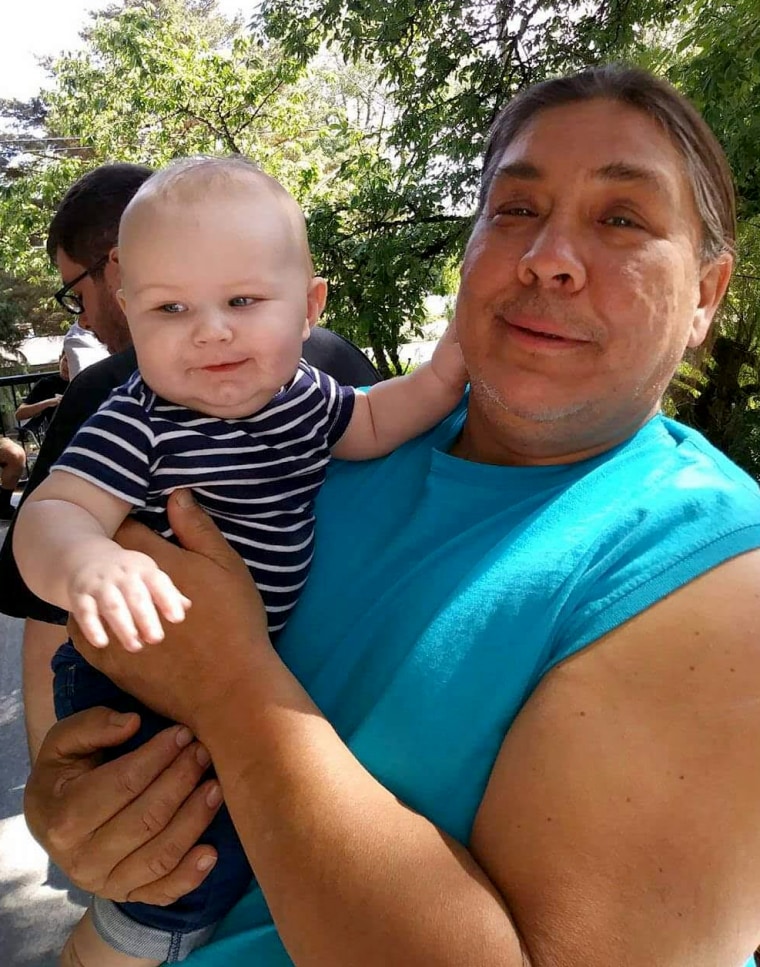
Kathy Peltier said she had been hopeful that past administrations would listen. But the presidencies of Clinton, George W. Bush, Barack Obama and Donald Trump came and went.
In December 2016, Leonard Peltier’s youngest son, Wahacanka Paul Shields-Peltier, died on a trip to Washington, D.C., advocating for his father’s release. He was 41.
He died in the waning days of Obama’s second term, when the family remained optimistic that the president would grant Peltier clemency.
With the loss of her brother and the realization that her father would never get to see him again, Kathy Peltier was in shock.
Kathy Peltier said that on the day Obama left office after having commuted hundreds of sentences — by far the most of any recent president — she turned off her phone and refused to leave her bedroom.
“I shut out the world,” she said.
Kathy Peltier, 46, has known her father only as a federal prisoner. She said it has been difficult to come to terms with how he has missed out on his family’s lives. He has six surviving children and a dozen great-grandchildren.
Peltier’s oldest son, Chauncey Peltier, 56, who lives in Oregon, previously saw his father in 2015, when he visited him in prison. To channel his emotions, Leonard Peltier took up oil painting featuring Native American themes and iconography.
“The family prays every day and hopes he gets to go home, but some of us aren’t hopeful it will ever happen,” he said. “In his children’s eyes, Leonard wasn’t the only one robbed.”
Source: | This article originally belongs to Nbcnews.com


